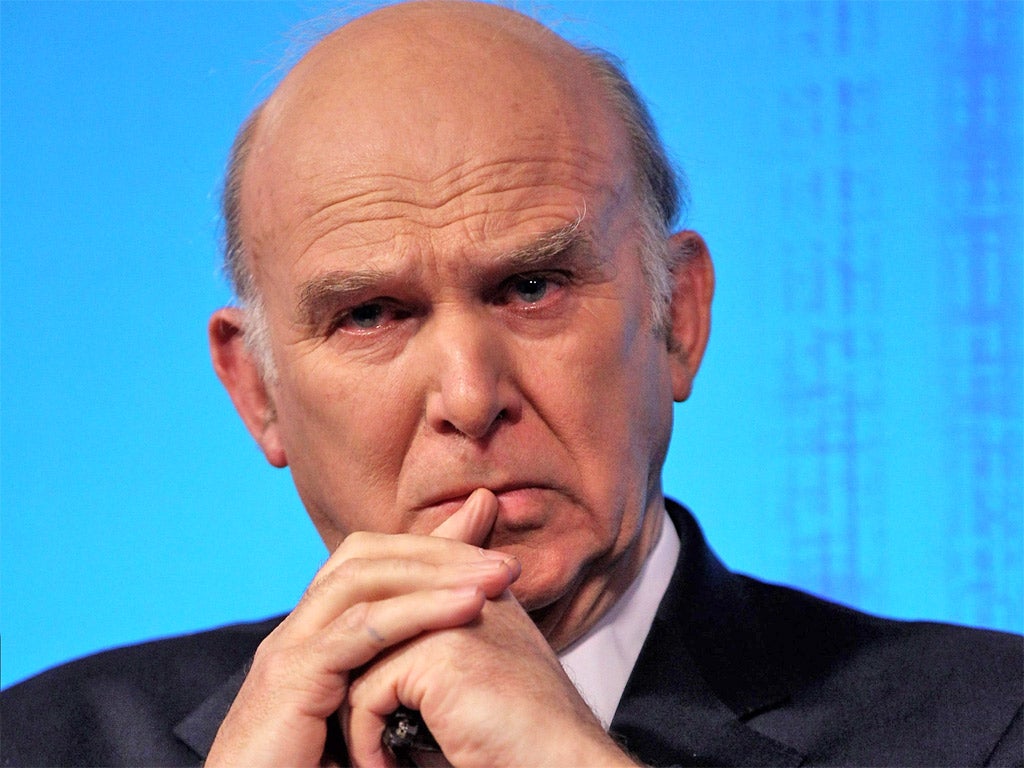Vince Cable refuses to name firms that tried to export chemicals to Syria

Your support helps us to tell the story
From reproductive rights to climate change to Big Tech, The Independent is on the ground when the story is developing. Whether it's investigating the financials of Elon Musk's pro-Trump PAC or producing our latest documentary, 'The A Word', which shines a light on the American women fighting for reproductive rights, we know how important it is to parse out the facts from the messaging.
At such a critical moment in US history, we need reporters on the ground. Your donation allows us to keep sending journalists to speak to both sides of the story.
The Independent is trusted by Americans across the entire political spectrum. And unlike many other quality news outlets, we choose not to lock Americans out of our reporting and analysis with paywalls. We believe quality journalism should be available to everyone, paid for by those who can afford it.
Your support makes all the difference.Vince Cable has been accused of hampering a parliamentary investigation into the sale of potential nerve gas ingredients to Syria by refusing to disclose the names of British companies granted export licences for the chemicals.
The Business Secretary has said he cannot identify the two companies given licences last year to send to Syria two chemicals which can be used as precursors in the production of weapons such as sarin, due to the “possible reputational damage” that would be caused by making their names public.
The Department for Business, Innovation and Skills (BIS) has said that the chemicals, which were due to be sent to a company in Damascus at a time when Syria’s civil war had been raging for 10 months, were for a legitimate use and none of the companies had done anything wrong.
But the senior Conservative MP who heads the select committee charged with monitoring Britain’s arms export controls strongly criticised Mr Cable yesterday, saying his refusal meant MPs were unable to scrutinise the actions of his own department.
Sir John Stanley, chairman of the Committees on Arms Export Controls, called on the Liberal Democrat deputy leader to reconsider his refusal, warning it was a “serious matter”.
Accusing Mr Cable of providing “no substantive justification” for withholding the names, Sir John said: “The effect of the Business Secretary’s refusal to disclose the names of the companies is to prevent the committees from taking evidence from them.”
In a letter to Mr Cable, the MP said that there was no suggestion that the companies – which applied for export licences for two dual-use chemicals to be sent for use in manufacturing window frames – had acted in anything other than “an entirely proper way”.
Sir John added: “With regard to ‘possible reputational damage’, the prime object of the committees’ scrutiny of this key issue is not the companies but the Government – your own department in particular.” A BIS spokeswoman said Mr Cable was considering Sir John’s request.
It was revealed last month that the Department for Business had authorised several shipments of sodium fluoride and potassium fluoride between 2004 and 2012, including two licences granted last January amid warnings that President Bashar al-Assad was prepared to use chemical weapons against his own people.
The department has since insisted that although the two export licences for a ton each of sodium fluoride and potassium fluoride were granted in January 2012, none of the chemicals was ever sent to Syria.
In a separate development, Mr Cable admitted he could not guarantee that allegations linking the Syrian company which would have received the chemicals to the former Iraqi dictator Saddam Hussein were taken into consideration when the licences were approved.
The Iraq Survey Group claimed in 2004 the company, Awad Ammora, was approached in 2002 or 2003 to procure aluminium for Saddam’s nuclear programme.
Join our commenting forum
Join thought-provoking conversations, follow other Independent readers and see their replies
Comments